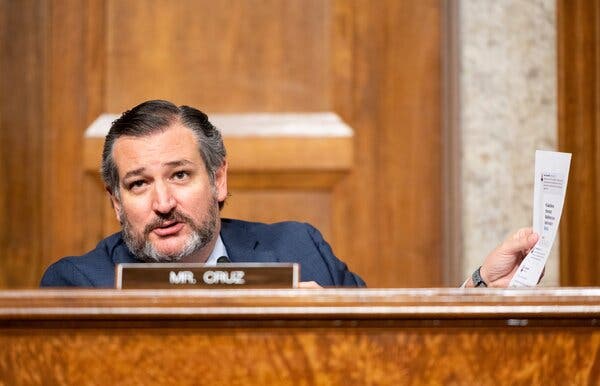
Lawmakers lashed out at the Facebook Oversight Board’s ruling on Wednesday to uphold the social network’s ban on former President Donald J. Trump, at least for now.
Driving the discontent was that the Oversight Board, a quasi-court that confers over some of Facebook’s content decisions, did not make a black-and-white decision about the case. Mr. Trump had been blocked from the social network in January after his comments online and elsewhere incited the storming of the Capitol building.
While the Oversight Board said on Wednesday that Facebook was justified in suspending Mr. Trump at the time because of the risk of further violence, it also said the company needed to revisit its action. The board said Facebook’s move was “a vague, standardless penalty” without defined limits, which needed to be reviewed again for a final decision on Mr. Trump’s account in six months.
That angered both Republicans and Democrats. Republican lawmakers have pointed to Mr. Trump’s ouster by Facebook, Twitter and others as evidence of an alleged anti-conservative campaign by tech companies, calling the decisions a dangerous precedent for censorship of political figures.
Senator Ted Cruz, Republican of Texas, tweeted that the board’s decision on Wednesday was “disgraceful” and warned it could have dangerous ripple effects.
“For every liberal celebrating Trump’s social media ban, if the Big Tech oligarchs can muzzle the former President, what’s to stop them from silencing you?” Mr. Cruz said in his tweet.
Senator Marsha Blackburn, Republican of Tennessee, said in a statement that the move showed that “it’s clear that Mark Zuckerberg views himself as the arbiter of free speech.” Republican members of the House judiciary committee tweeted that the decision was “pathetic,” and Jim Jordan of Ohio, the ranking member, tweeted about Facebook: “Break them up.”
Democrats, also dissatisfied with the murky decision, took aim at how Facebook can be used to spread lies. Frank Pallone, the chairman of the House energy and commerce committee, tweeted: “Donald Trump has played a big role in helping Facebook spread disinformation, but whether he’s on the platform or not, Facebook and other social media platforms with the same business model will find ways to highlight divisive content to drive advertising revenues.”
Representative Ken Buck, Republican of Colorado and the ranking member of the House antitrust subcommittee, accused the Oversight Board of political bias.
“Facebook made an arbitrary decision based on its political preferences, and the Oversight Board, organized and funded by Facebook, reaffirmed its decision,” he said.
But scholars who support free speech welcomed the decision. They have warned that as social media companies become more active in determining what stays online and what doesn’t, that could potentially lead to a slippery slope where tech giants have too much sway over digital speech.
“The Facebook Oversight Board has said what many critics noted — the ban of former President Trump, while perhaps justified, was worrisome in its open-endedness and lack of process,” said Gautam Hans, a law professor at Vanderbilt University. “To the degree that the decision draws attention to how ad hoc, manipulable, and arbitrary Facebook’s own content policies get enforced, I welcome it.”
Mike Isaac contributed reporting.

A Facebook-appointed panel of journalists, activists and lawyers ruled on Wednesday to uphold the social network’s ban of former President Donald J. Trump, ending any immediate return by Mr. Trump to mainstream social media and renewing a debate about tech power over online speech.
But the board also said that Facebook’s penalty of an indefinite suspension was “not appropriate,” and that the company should apply a “defined penalty.”
Read our ongoing coverage here:
Facebook Oversight Board Upholds Social Network’s Ban of Trump
A company-appointed panel ruled that the ban was justified at the time but added that the company should reassess its action and make a final decision in six months.
What Is the Facebook Oversight Board?
The panel of about 20 people includes academics and political leaders.
Lawmakers Slam Facebook Board’s Decision to Uphold Trump Ban
“What’s to stop them from silencing you?” Senator Ted Cruz replied on Twitter.
The Treasury Department on Wednesday called on Congress to address a looming cap on the amount of debt the government can issue, warning that a surge of expenditures related pandemic could render its traditional tools for keeping the nation from breaching the debt limit less effective.
A divided congress passed a two-year budget deal in 2019 that suspended the so-called debt ceiling until July 31. The agreement, which was made before the pandemic struck, was intended to put off budget battles and give clarity over spending going into a presidential election year. Now, the Biden administration and a Congress controlled by Democrats must make sure the government can continue borrowing to pay its bills.
“If Congress has not acted by July 31, Treasury, as it has in the past, may take certain extraordinary measures to continue to finance the government on a temporary basis,” said Brian Smith, Treasury’s deputy assistant secretary for federal finance. “In light of the substantial Covid-related uncertainty about receipts and outlays in the coming months, it is very difficult to predict how long extraordinary measures might last.”
Negotiations over raising or suspending the debt limit are often fraught, and Treasury has developed tools over the years to give the federal government more flexibility as the deadline approaches. Those “extraordinary measures” include suspending sales of State and Local Government Series Treasury securities and suspending reinvestment of the Exchange Stabilization Fund. Treasury can also redeem existing investments of the Civil Service Retirement and Disability Fund and the Postal Service Retiree Health Benefits Fund and suspend reinvestment of the Government Securities Investment Fund.
In the past, those measures have allowed the Treasury Department to extend the debt limit deadline on its own for months. But Mr. Smith said that Treasury is studying potential scenarios “in which extraordinary measures could be exhausted much more quickly than in prior debt limit episodes.”
Asked in a press briefing if Treasury was considering prioritizing payments if the deadline is missed, Mr. Smith said: “Congress needs to raise or suspend the debt limit, that’s the way to resolve this issue.”
The debt limit warning came as part of the Treasury Department’s quarterly announcement about its financing plans. Treasury said earlier this week that it expects to borrow more than $1 trillion during the rest of the fiscal year as the United States continues spending heavily to combat the coronavirus crisis.

General Motors said it made a $3 billion profit in the first three months of the year, but warned that its profit would be significantly smaller in the second quarter because of a global shortage computer chips.
Last year, G.M. made a profit of just $294 million in the first quarter as the coronavirus pandemic took hold and shut down much of the global economy.
The company forecasts net income for the first half of the year would total about $3.5 billion, implying a profit of around $500 million in the second quarter. It said it expected a rebound in the second half and predicted net income for the full year to range from $6.8 billion to $7.6 billion.
“This remains a challenging period for the company as we emerge from 2020, but the team continues to demonstrate its ability to manage complex situations,” G.M.’s chief executive, Mary Barra, said in a letter to shareholders.
Separately, Stellantis, the company formed by the merger of Peugeot SA and Fiat Chrysler, reported revenue of 34 billion euros ($41 billion) since the merger was completed on Jan. 17. Had the merger been completed earlier, the new company’s revenue for the full first quarter would have been 37 billion euros, up 14 percent over the same period a year ago.
Stellantis said its production in the first quarter was 11 percent lower than planned because of the chip shortage, and it also warned that the second quarter would be weaker than the first.

The European Union’s administrative arm said Wednesday that it would take action against foreign companies that receive financial support from their governments, a move clearly aimed at China amid signs of deteriorating ties.
The tougher line against China comes only four months after Brussels and Beijing seemed to be moving closer, working out an agreement in December intended to make it easier for European companies to invest in what has become the bloc’s most important trading partner for goods.
But since then relations have gone downhill because of tension over Chinese policy toward minority groups in Xinjiang province.
Legislation proposed by the European Commission Wednesday would give it power to investigate and take measures against foreign companies that use government subsidies to get an unfair advantage over domestic competitors, an accusation often leveled at China. A separate proposal, also announced Wednesday, is intended to make Europe less dependent on China for crucial goods like semiconductors, drugs and batteries.
The proposals came a day after Valdis Dombrovskis, the European commissioner for trade, said that work on finalizing the December investment agreement with Beijing was on hold because of repressive Chinese policies.
In March, the European Commission sanctioned four Communist Party officials after accusing them of being responsible for human rights violations against members of the Muslim Uyghurs and other minority groups in Xinjiang.
China retaliated with sanctions against numerous members of the European Parliament, several scholars, and employees of human rights organizations and think tanks which have been critical of China.
In light of the sanctions war, Mr. Dombrovskis told Agence France-Presse on Tuesday that “it’s clear the environment is not conducive for ratification of the agreement.”
This is what @VDombrovskis told @AFP on the ratification of #CAI with China – not first time he’s said it & not breaking news.
To be clear: this is not a formal suspension decision, just means there’s no political outreach right now to promote the agreement – see end of quote. pic.twitter.com/P1CgzkMu8e
— Vanessa Mock (@vanessamock) May 4, 2021
Europe’s tougher line toward China brings it closer to the stance adopted by the Biden administration, which objected to the investment agreement. But Europe remains divided over how to approach an important trading partner that is also a geopolitical rival.
Markus J. Beyrer, director general of BusinessEurope, a leading business lobby, said in a statement Wednesday that the proposal on subsidies is “a step in the right direction in addressing existing legal loopholes and preventing market distortions.”
But a prominent business group in Germany, which is highly dependent on exports to China, was critical.
“The proposed regulation is very complex and there is a risk that its implementation will lead to considerable additional bureaucracy and legal uncertainty for our member companies,” said Ulrich Ackermann, managing director of foreign trade at V.D.M.A., which represents German makers of industrial equipment.
Dogecoin, the cryptocurrency that started as a joke, is on a tear. A surge in the past day pushed it to another record, sending it some 14,000 percent higher than it started the year.
One theory is that the upcoming appearance of Elon Musk, the Tesla chief executive and noted Dogecoin superfan, as the host of “Saturday Night Live” on May 8 could get more people interested in trading the crypto token. It’s as good a reason as any for those who try to rationalize its movements.
The latest bout of Dogecoin mania has somewhat overshadowed what’s going on in Ethereum, the second-largest cryptocurrency, which also set records this week and made its 27-year-old co-creator, Vitalik Buterin, a billionaire (in dollars). The price of Ether, the crypto token built on the Ethereum blockchain, is up more than 350 percent for the year to date, outpacing Bitcoin’s relatively pedestrian 90 percent gain — which, for context, outpaces every stock in the S&P 500 over that period.
Stocks rebound
-
Stocks on Wall Street rose on Wednesday, following European markets higher, and rebounding from a decline the day before.
-
The S&P 500 rose about half a percent, while the Stoxx Europe 600 index rose 1.5 percent. The FTSE 100 in Britain rose 1.2 percent.
-
In oil markets, Brent crude gained 1.1 percent, to $69.61 a barrel, and West Texas Intermediate rose 1 percent to $66.32 a barrel.
European economy
-
New data on the European economy from IHS Markit reflected continued strengthening. The eurozone composite purchasing managers’ index (PMI) for April grew for the second consecutive month. Significantly, the service sector grew after seven months of contraction.
-
“The updated services PMIs for April confirmed that the worst for the eurozone economy should be over,” said Nicola Nobile, the lead eurozone economist for Oxford Economics, in a note to clients. “The vaccination progress and the gradual reopening of some of the economies point to” an increase in economic output already underway, she added.
More chip worries
-
Stellantis, the name for the merger of Fiat Chrysler and PSA, the maker of Peugeot, said the semiconductor shortage caused an 11 percent decline in production of automobiles in the first quarter, representing about 190,000 vehicles.
-
Dealer inventories were down in all areas, “primarily due to the semiconductor shortage,” the company said. Despite that, Stellantis reported net revenue up 14 percent. Shares gained 3 percent in European trading.

Four weeks before its scheduled end, the federal government’s signature aid effort for small business ravaged by the pandemic — the Paycheck Protection Program — ran out of funding on Tuesday afternoon and stopped accepting most new applications.
Congress allocated $292 billion to fund the program’s most recent round of loans. Nearly all of that money has now been exhausted, the Small Business Administration, which runs the program, told lenders and their trade groups on Tuesday. (An earlier version of this item misstated that the actions it described occurred Wednesday.)
While many had predicted that the program would run out of funds before its May 31 application deadline, the exact timing came as a surprise to many lenders.
“It is our understanding that lenders are now getting a message through the portal that loans cannot be originated,” the National Association of Government Guaranteed Lenders, a trade group, wrote in an alert to its members Tuesday evening. “The P.P.P. general fund is closed to new applications.”
Some money — around $8 billion — is still available through a set-aside for community financial institutions, which generally focus on lending to businesses run by women, minorities and other underserved communities. Those lenders will be allowed to process applications until that money runs out, according to the trade group’s alert.
Confirming that the program is out of funds, a spokeswoman for the Small Business Administration said that the S.B.A. is “committed to delivering economic aid through the many Covid relief programs it’s currently administering and beyond.”
Some money remains available for lenders to finish processing pending applications that were already submitted to the agency, according to S.B.A. officials and lenders. But people whose applications had not yet been sent in for approval are at risk of being shut out.
Since its creation last year, the Paycheck Protection Program has disbursed $780 billion in forgivable loans to fund 10.7 million applications, according to the latest government data. Congress renewed the program in December’s relief bill, expanding the pool of eligible applicants and allowing the hardest-hit businesses to return for a second loan.
Lawmakers in March extended the program’s deadline to May, but they have shown little enthusiasm for adding significantly more money to its coffers. With vaccination rates increasing and pandemic restrictions easing, Congress’s focus on large-scale relief effort for small businesses has waned.
But Senator Ben Cardin, Democrat of Maryland and the chair of the Senate’s small business and entrepreneurship committee, “remains open to a bipartisan agreement to add funds to the program,” a spokesman for Mr. Cardin said.
Representative Nydia M. Velázquez, a New York Democrat who chairs the House of Representative’s small business committee, is also open to a deal to extend the program, her office said.
The government’s recent efforts have been focused on the most devastated industries. Two new grant programs run by the Small Business Administration — for businesses in the live-events and restaurant industries — began accepting applications in recently, though no grants have yet been awarded.

When Bill and Melinda Gates announced filed for divorce in Washington State on Monday, grant recipients and staff members alike wondered what would happen to the Bill and Melinda Gates Foundation.
The message from the headquarters in Seattle was clear: The Bill and Melinda Gates Foundation isn’t going anywhere.
The foundation’s $50 billion endowment is in a charitable trust that is irrevocable, Nicholas Kulish reports for The New York Times. It cannot be removed or divided up as a marital asset, said Megan Tompkins-Stange, a professor of public policy and scholar of philanthropy at the University of Michigan. She noted, however, that there was no legal mandate that would prevent them from changing course.
“I think there may be changes to come,” she said. “But I don’t see it as a big asteroid landing on the field of philanthropy as some of the hyperbole around this has indicated.”
The foundation, which set a new standard for private philanthropy in the 21st century, has given away nearly $55 billion, giving the couple instant access to heads of state and leaders of industry.
The couple’s prominence has also brought a fair share of scrutiny, throwing a spotlight on Mr. Gates’s robust defense of intellectual property rights — in this case, specific to vaccine patents — even in a time of extreme crisis, as well as the larger question of how unelected wealthy individuals can play such an outsize part on the global stage.
“In a civil society that is democratic, one couple’s personal choices shouldn’t lead university research centers, service providers and nonprofits to really question whether they’ll be able to continue,” said Maribel Morey, founding executive director of the Miami Institute for the Social Sciences.







/https://static.texastribune.org/media/files/73f484170efa6e83d746b920406efbc9/14%20-%200404%20Terlingua%20Water%20EH%2021.jpg?w=330&resize=330,220&ssl=1)